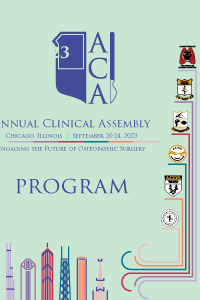General Surgery
Determining the Impact of Individual Ventral Hernia Repair Complications on Patient-Reported Quality of Life
- RA
Ramez Alzatari
Ohio University Heritage College of Osteopathic Medicine
Columbus, Ohio, United States
Primary Presenter(s)
Ventral hernia repair (VHR) postoperative complications vary in presentation, management, and severity. The aim of this study is to determine the impact of individual postoperative complications on long-term quality of life (QoL) after VHR.
Methods or Case Description:
Data from the Abdominal Core Health Quality Collaborative were analyzed retrospectively. Propensity score matching compared 1-year postoperative Hernia-Related Quality of Life Survey (HerQLes) summary scores between non-wound events (NWE), surgical site infection (SSI), and surgical site occurrence requiring procedural intervention (SSOPI) versus No-Complications.
Outcomes:
2,796 patients who underwent VHR between 2013 and 2022 met the study criteria. Patients with SSI and SSOPI had lower QoL vs. No-Complications (median (Interquartile range): 71 (40-92) vs 83 (52-94), p=0.02; 68 (40-90) vs 78 (55-95), p=0.008). NWE Vs. No-Complications HerQLes score differences were similar (83 (53-92) vs 83 (60-93), p=0.19).
Conclusion:
Wound events seem to have a larger impact on patients’ long-term QoL compared to NWE. Continued and aggressive efforts, including preoperative optimization, technical points, and appropriate use of minimally invasive techniques can continue to reduce impactful wound events.

